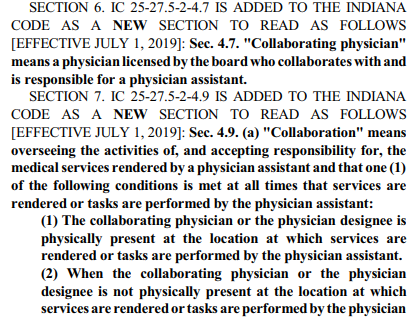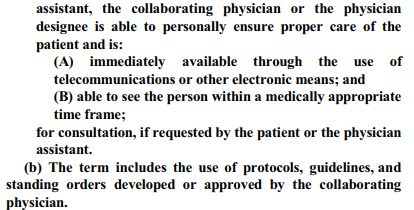Under Indiana law, physician assistants are healthcare professionals that work with and alongside physicians and nurse practitioners. Physician assistants are unique in that they have a dependent license and scope of practice on that of a physician. Nurse practitioners on the other hand, have an independent license and scope of practice. As a part of this dependent practice a physician assistant and a physician must have certain contractual obligations in place and must be supervised. The Indiana legislature addressed that very issue this year leaving many puzzled as to the purpose.
Under current Indiana laws as well as federal laws, a physician assistant must be supervised by a physician. While the term supervision does not necessarily mean physical presence, it does include legal responsibility as well as immediate availability. The current laws in Indiana require that a physician assistant and a supervising physician maintain a supervisory practice agreement. This agreement outlines the approved scope of practice of the physician assistant as well as certain quality initiatives related to chart reviews. This supervisory agreement concept is virtually consistent across the entire United States for physician assistants and federal Medicare regulations also require supervision.
Proposed Changes and Why
The Indiana legislature this year sought to to change the name of this relationship from supervisory to collaboration. Based upon testimony by multiple stakeholders, the reason for the change was due to physician assistants perception of job loss to nurse practitioners due to the concept of supervision. The belief was that the word supervision connotes a barrier that nurse practitioners do not have. In addition, the bill author even noted this is a change in word only and not in practice.
In short, the change of the word supervisory to collaboration has no legal effect. Further, it oddly looks like the Indiana legislature just approved a change to statutory law that is a change in name only and may conflict with the natural and customary definitions of supervision and collaboration.
The new definition is below:


Conflicts With Federal Law and Common Definitions
First, Federal law has completely different definitions for these terms. For example, according to Federal Law “collaboration is a process in which a nurse practitioner has a relationship with one or more physicians to deliver health care services” whereas physician assistants can only provide services under the “general supervision of a physician (The supervising physician need not be physically present when the physician assistant is performing the services unless required by State law; however, the supervising physician must be immediately available to the physician assistant for consultation).”
Second, “overseeing the activities of”, “accepting responsibility for”, and “immediately available” do not naturally fit with the word collaboration. They naturally fit with supervision. Merriam Webster’s definition of Supervise is “to be in charge of” which is essentially what this law includes. A physician overseeing and accepting responsibility for a physician assistant.
The Merriam Webster’s definition of Collaborate is “to work jointly with others or together especially in an intellectual endeavor” but it does not imply any oversight or one accepting responsibility for the other. For example, an attorney collaborates with accountants on tax issues. While one is not responsible for the other, they work together to solve problems. On the other hand, an attorney supervises paralegals on filing pleadings with the court. The attorney is responsible for and overseeing the filing.
What is the Impact?
The impact to this change is not addressing the perceived concerns of physicians assistants. Those legal and regulatory barriers still exist. This changes a word and is now going to require all Indiana health systems and medical groups to change the title of their current “Supervisory Agreements”.

